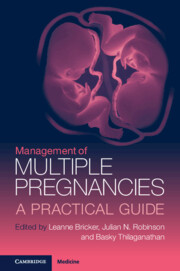Book contents
- Management of Multiple Pregnancies
- Management of Multiple Pregnancies
- Copyright page
- Contents
- Editors
- Contributors
- Chapter 1 Epidemiology of Multiple Pregnancy
- Chapter 2 Assisted Conception and Multiple Pregnancy
- Chapter 3 Zygosity, Chorionicity and Amnionicity
- Chapter 4 Multifetal Pregnancy Reduction
- Chapter 5 Gestational Dating in Multiple Pregnancy
- Chapter 6 Screening for Fetal Aneuploidy in Multiple Pregnancy
- Chapter 7 Screening for Fetal Abnormality in Multiple Pregnancy
- Chapter 8 Screening and Diagnosis of Complications of Shared Placentation
- Chapter 9 Invasive Prenatal Diagnosis in Multiple Pregnancy
- Chapter 10 Conjoined Twinning
- Chapter 11 Management of Discordant Fetal Anomaly
- Chapter 12 Single and Double Fetal Loss in Twin Pregnancy
- Chapter 13 Management of Twin–Twin Transfusion Syndrome
- Chapter 14 Management of Twin Anaemia-Polycythaemia Sequence
- Chapter 15 Management of Twin-Reversed Arterial Perfusion (TRAP) Sequence
- Chapter 16 Management of Fetal Growth Pathology in Multiple Pregnancy
- Chapter 17 Management of Monoamniotic Twins
- Chapter 18 Maternal Complications in Multiple Pregnancy
- Chapter 19 Risk Assessment and Screening for Preterm Birth in Multiple Pregnancy
- Chapter 20 Prevention of Preterm Birth in Multiple Pregnancies
- Chapter 21 Optimal Antenatal Care in Multiple Pregnancy
- Chapter 22 Triplet and Higher-Order Pregnancy
- Chapter 23 Timing of Delivery in Multiple Pregnancy
- Chapter 24 Mode of Delivery in Multiple Pregnancy
- Chapter 25 Practical Management of Vaginal Delivery in Multiple Pregnancy
- Chapter 26 Neonatal Care Aspects of Multiple Pregnancy
- Chapter 27 Lifestyle Considerations for Multiple Pregnancy
- Chapter 28 Emotional and Mental Well-Being in Multiple Pregnancy
- Chapter 29 New Frontiers in Multiple Pregnancy Management
- Chapter 30 Multiple Pregnancy Resources for Professionals and the Public
- Chapter 31 Obstetric Anaesthesia in Multiple Pregnancy
- Index
- Plate Section (PDF Only)
- References
Chapter 21 - Optimal Antenatal Care in Multiple Pregnancy
Published online by Cambridge University Press: 11 October 2022
- Management of Multiple Pregnancies
- Management of Multiple Pregnancies
- Copyright page
- Contents
- Editors
- Contributors
- Chapter 1 Epidemiology of Multiple Pregnancy
- Chapter 2 Assisted Conception and Multiple Pregnancy
- Chapter 3 Zygosity, Chorionicity and Amnionicity
- Chapter 4 Multifetal Pregnancy Reduction
- Chapter 5 Gestational Dating in Multiple Pregnancy
- Chapter 6 Screening for Fetal Aneuploidy in Multiple Pregnancy
- Chapter 7 Screening for Fetal Abnormality in Multiple Pregnancy
- Chapter 8 Screening and Diagnosis of Complications of Shared Placentation
- Chapter 9 Invasive Prenatal Diagnosis in Multiple Pregnancy
- Chapter 10 Conjoined Twinning
- Chapter 11 Management of Discordant Fetal Anomaly
- Chapter 12 Single and Double Fetal Loss in Twin Pregnancy
- Chapter 13 Management of Twin–Twin Transfusion Syndrome
- Chapter 14 Management of Twin Anaemia-Polycythaemia Sequence
- Chapter 15 Management of Twin-Reversed Arterial Perfusion (TRAP) Sequence
- Chapter 16 Management of Fetal Growth Pathology in Multiple Pregnancy
- Chapter 17 Management of Monoamniotic Twins
- Chapter 18 Maternal Complications in Multiple Pregnancy
- Chapter 19 Risk Assessment and Screening for Preterm Birth in Multiple Pregnancy
- Chapter 20 Prevention of Preterm Birth in Multiple Pregnancies
- Chapter 21 Optimal Antenatal Care in Multiple Pregnancy
- Chapter 22 Triplet and Higher-Order Pregnancy
- Chapter 23 Timing of Delivery in Multiple Pregnancy
- Chapter 24 Mode of Delivery in Multiple Pregnancy
- Chapter 25 Practical Management of Vaginal Delivery in Multiple Pregnancy
- Chapter 26 Neonatal Care Aspects of Multiple Pregnancy
- Chapter 27 Lifestyle Considerations for Multiple Pregnancy
- Chapter 28 Emotional and Mental Well-Being in Multiple Pregnancy
- Chapter 29 New Frontiers in Multiple Pregnancy Management
- Chapter 30 Multiple Pregnancy Resources for Professionals and the Public
- Chapter 31 Obstetric Anaesthesia in Multiple Pregnancy
- Index
- Plate Section (PDF Only)
- References
Summary
In multiple pregnancy there is increased risk of adverse outcome for both mother and babies. Providing high quality antenatal care to optimize outcomes and effectively identify and manage complications is crucial. There are a number of additional elements of care recommended which herald the need for more monitoring and contact with healthcare professionals with appropriate expertise. Additionally, women and their families require emotional support and accurate reliable information to help navigate the anxiety and stress of these higher risk pregnancies. Early pregnancy care focuses on accurate gestational dating, determining chorionicity and amnionicity, and screening for fetal complications. Later in pregnancy care concentrates on identifying and managing growth pathology, preterm birth, maternal complications, and planning for delivery. Evidence to guide management of these challenging pregnancies is often lacking, in particular there is limited evidence to guide management for triplet and higher order multiple pregnancy. Fortunately, expert-led international guidelines to inform and support health care professionals to deliver the required care have been shown objectively to improve outcomes when implemented.
- Type
- Chapter
- Information
- Management of Multiple PregnanciesA Practical Guide, pp. 221 - 232Publisher: Cambridge University PressPrint publication year: 2022

